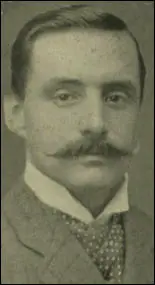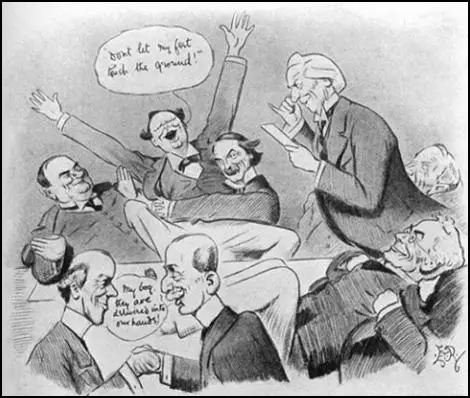Charles Hobhouse

Charles Hobhouse, the only son and third of six children of Sir Charles Parry Hobhouse and Edith Turton Hobhouse, was born at Dormansland, near Lingfield, Surrey, on 30th June 1862. His father was a former judge in the high court of Calcutta.
Hobhouse was educated at Eton College (1875–9) and at Christ Church (1880–81). After leaving Oxford University he attended the Sandhurst Royal Military College. He joined the King's Royal Rifle Corps in 1884. He became involved in politics after marrying Georgina Fleetwood, the daughter of George Pargiter Fuller, the Liberal Party MP for Westbury. (1)
In 1892 Hobhouse won Wiltshire East for the Liberals. He lost his seat in the 1895 Election but won Bristol East in 1900. In the 1906 General Election the Liberal Party won 397 seats (48.9%) compared to the Conservative Party's 156 seats (43.4%). The Labour Party, led by Keir Hardie did well, increasing their seats from 2 to 29. In the landslide victory Balfour lost his seat as did most of his cabinet ministers. Margot Asquith wrote: "When the final figures of the Elections were published everyone was stunned, and it certainly looks as if it were the end of the great Tory Party as we have known it." (2)
Henry Campbell-Bannerman appointed Hobhouse as under-secretary of state for India. He headed a royal commission into decentralization whose report influenced subsequent Indian legislation. H. H. Asquith replaced Campbell-Bannerman as prime minister and in April 1908 Hobhouse became financial secretary to the Treasury, and worked under David Lloyd George, the Chancellor of the Exchequer.
Charles Hobhouse and David Lloyd George
It has been argued that the appointment of "Hobhouse... was clearly intended to reassure traditionalists, since he was as unlike Lloyd George as any man could be - an Old Etonian squire, and a strong Churchman, whose recreations were hunting and shooting. He also kept a diary, extracts from which have recently been published. They show that he had a grudging admiration for Lloyd George, combined with a laughable belief in his own superior worldly wisdom." (3)
Hobhouse recorded in his diary: "Lloyd George has an extraordinary power of picking up the essential details of a question by conversation. He refuses to read any office files or papers, but likes people to come and talk. He also possesses a great gift of imposing on people the idea that he sees and agrees with their side of a question to the exclusion of all other aspects. But his absolute contempt for details and ignorance of common facts of life make him a bad official, and about the end of June, Asquith instructed me to come and see him weekly on the financial position, and let him know how things stood." (4)
Hobhouse helped Lloyd George to get his People's Budget though Parliament. He recorded in his diary: "I asked Lloyd George what he really wanted, the Budget to pass, or be rejected, and suggested that the author of a successful financial scheme such as his was far more likely to go down to posterity than one who was Chancellor of the Exchequer merely... He agreed but added that he might be remembered even better as one who had upset the hereditary House of Lords." (5)

House of Lords: from top left, clockwise: Richard Haldane, Winston Churchill,
David Lloyd George, H. H. Asquith, John Morley, Augustine Birrell,
Robert Crewe-Milnes and Reginald McKenna. (1909)
In October 1911, Hobhouse gained a place in the cabinet as chancellor of the duchy of Lancaster. He was on the left-wing of the Liberal Party and in February 1912, he was one of the the twenty-five Liberal MPs who supported a Labour Party motion that demanded a national minimum wage. The following month he joined forces with Arnold Rowntree and John A. Hobson to submit a paper to Cabinet on the issue: "The time has come to have in mind as the distinct objective of the Liberal policy, the general principle of a living wage for every worker." (6)
Postmaster-General
Charles Hobhouse was appointed postmaster-general in February 1914. This was a sensitive position as the former holder of the position, Herbert Samuel, had been accused of corruption when he negotiated a contract with English Marconi Company to provide a wireless-telegraphy system for the British Empire. Although the Parliamentary Select Committee Majority report had claimed that no Minister had been influenced in the discharge of his public duties by any interest he might have had in any of the Marconi or other undertakings, the Minority (opposition) report criticised the whole handling of the share issue and found "grave impropriety" in the conduct of David Lloyd George, Rufus Isaacs and Alexander Murray. (7)
On 28th July, 1914, Austria-Hungary declared war on Serbia. The following day the Kaiser Wilhelm II of Germany promised to Britain that he would not annex any French territory in Europe provided the country remained neutral. This offer was immediately rejected and at a Cabinet meeting on Friday, 31st July, the Cabinet discussed the possibility of joining the war. Only two ministers, Sir Edward Grey and Winston Churchill, argued in favour and H. H. Asquith appeared to support them. (8)
Charles Hobhouse recorded that David Lloyd George had changed his mind on the issue: "At first Lloyd George was very strongly anti-German... but as the Liberal papers were very anti-war, he veered round and became peaceful. Churchill was of course for any enterprise which gave him a chance of displaying the Navy as his instrument of destruction." (9)
More than half the Cabinet, including Charles Hobhouse, David Lloyd George, Charles Trevelyan, John Burns, John Morley, John Simon, Thomas McKinnon Wood and William Lygon, 7th Earl Beauchamp, were opposed to Britain entering the war. George Riddell wrote: "I gathered that John Burns had practically resigned, and that Simon, Earl Beauchamp, Morley and Mackinnon Wood were considering the advisability of doing so." (10)
First World War
On 1st August, 1914, Edward Grey told the French Ambassador in London that the British government would not stand by and see the German Fleet attack the French Channel Ports. When he heard what had happened, John Burns immediately resigned as he now knew war was inevitable. Charles Trevelyan, John Morley and John Simon also handed in letters of resignation with "at least another half-dozen waited upon the effective hour". (11)
Hobhouse now decided to change sides. So did Lloyd George, although he remained unconvinced that Britain should go to war over this issue. His friend, George Riddell, pointed out that he was coming under great pressure from pacifists in the Liberal Party. (12) H. H. Asquith argued: "Some ministers believed that we should declare now and at once that in no circumstances would we take a hand. There is no doubt that, for the moment, that is the view of the bulk of the party. Lloyd George - all for peace - is more sensible and statesmanlike, keeping the position open." (13)
On 4th August 1914, the German Army marched into Belgium. According to the historian, A. J. P. Taylor: "At 10.30 p.m. on 4th August 1914 the king held a privy council at Buckingham Palace, which was attended only by one minister and two court officials. The council sanctioned the proclamation of a state of war with Germany from 11 p.m. That was all. The cabinet played no part once it had resolved to defend the neutrality of Belgium. It did not consider the ultimatum to Germany, which Sir Edward Grey, the foreign secretary, sent after consulting only the prime minister, Asquith, and perhaps not even him." (14)
The First World War ended Hobhouse's career. He lost office when the first coalition was formed in May 1915. At first he opposed military conscription but lost sympathy from radicals when he changed his mind on the issue. Later that year he supported H. H. Asquith against David Lloyd George. As a result he was badly beaten in the 1918 General Election. He even suffered the indignity of losing his deposit, a provision but recently instituted to discourage "freak" candidates. (15)
Charles Hobhouse died at his home, Monkton Farleigh Manor, Bradford-on-Avon, on 26th June 1941.
Primary Sources
(1) Charles Hobhouse, Inside Asquith's Cabinet (1977)
Lloyd George has an extraordinary power of picking up the essential details of a question by conversation. He refuses to read any office files or papers, but likes people to come and talk. He also possesses a great gift of imposing on people the idea that he sees and agrees with their side of a question to the exclusion of all other aspects.
But his absolute contempt for details and ignorance of common facts of life make him a bad official, and about the end of June Asquith instructed me to come and see him weekly on the financial position, and let him know how things stood.
(2) Charles Hobhouse, diary entry (31st October, 1909)
I asked Lloyd George what he really wanted, the Budget to pass, or be rejected, and suggested that the author of a successful financial scheme such as his was far more likely to go down to posterity than one who was Chancellor of the Exchequer merely... He agreed but added that he might be remembered even better as one who had upset the hereditary House of Lords.
(3) Trevor Wilson, Charles Hobhouse : Oxford Dictionary of National Biography (2004-2014)
In 1892 Hobhouse narrowly won Wiltshire East for the Liberals against a formidable Conservative opponent. In the ensuing parliament he served as a private secretary at the Colonial Office. The Liberal set-back in 1895 cost him his seat, and his chronic hay fever directed him to an urban constituency. He won East Bristol in 1900 and retained it in the general elections of 1906 and 1910.
The Liberals returned to office in 1905, and in 1907 Hobhouse became under-secretary of state for India. He headed a royal commission into decentralization whose report influenced subsequent Indian legislation. In April 1908 he became financial secretary to the Treasury, and in October 1911 gained a place in the cabinet as chancellor of the duchy of Lancaster. His career reached its peak in February 1914 when he became postmaster-general, an office then involved in the early developments of wireless telegraphy and the controversies concerning rival telegraphic systems. He succeeded his father in the baronetcy in 1916.
Hobhouse commanded confidence as a hard-working administrator and straightforward spokesman for his department. He did not make a great impact beyond his own office, nor was he in sympathy with some trends in Liberal affairs. He stood by traditional causes, such as free trade and Irish home rule, but he believed that David Lloyd George, as chancellor of the exchequer, should restrain spending and not encourage it. He deplored Sir Winston Churchill's big-navy policy, and he opposed quite provocatively the campaign for women's suffrage.
Student Activities
1832 Reform Act and the House of Lords (Answer Commentary)
The Chartists (Answer Commentary)
Women and the Chartist Movement (Answer Commentary)
Benjamin Disraeli and the 1867 Reform Act (Answer Commentary)
William Gladstone and the 1884 Reform Act (Answer Commentary)
Richard Arkwright and the Factory System (Answer Commentary)
Robert Owen and New Lanark (Answer Commentary)
James Watt and Steam Power (Answer Commentary)
Road Transport and the Industrial Revolution (Answer Commentary)
Canal Mania (Answer Commentary)
Early Development of the Railways (Answer Commentary)
The Domestic System (Answer Commentary)
The Luddites: 1775-1825 (Answer Commentary)
The Plight of the Handloom Weavers (Answer Commentary)
Health Problems in Industrial Towns (Answer Commentary)
Public Health Reform in the 19th century (Answer Commentary)
Walter Tull: Britain's First Black Officer (Answer Commentary)
Football and the First World War (Answer Commentary)
Football on the Western Front (Answer Commentary)
Käthe Kollwitz: German Artist in the First World War (Answer Commentary)
American Artists and the First World War (Answer Commentary)
